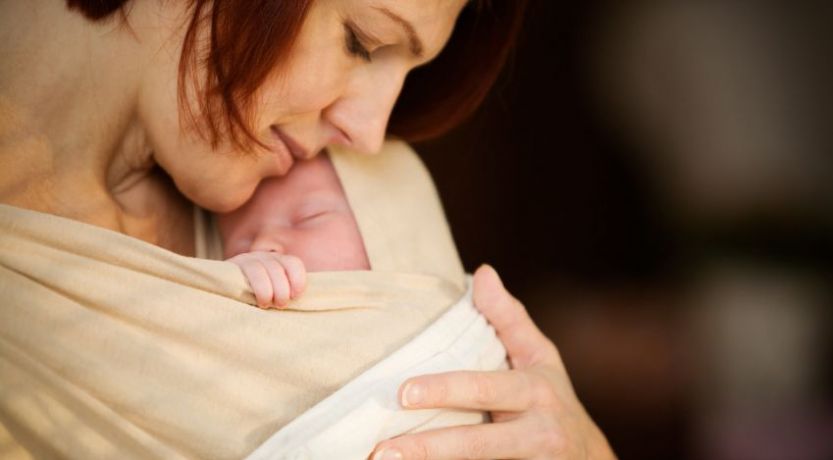Many know that God so loved the world that He gave His firstborn Son. Did you know that Hannah, a woman of faith in the Bible, gave her firstborn son to God?

The story of Hannah
The story of Hannah is found in 1 Samuel 1 and 2. She was loved by her husband, Elkanah, but the Lord had closed her womb. Being childless, she vowed to God that if He would give her a son, she would give him to the Lord all the days of his life.
Hannah’s name means “grace, mercy” (Gesenius’ Hebrew-Chaldee Lexicon).
We are told, “Hannah had no children” (1 Samuel 1:2). “To be a wife without bearing children has always been regarded in the East, not only as a matter of regret, but as a reproach which could lead to divorce” (New Bible Dictionary, “Barrenness”).
Hannah’s husband Elkanah loved her, and tried to encourage her. “Hannah, why do you weep? Why do you not eat? And why is your heart grieved? Am I not better to you than ten sons?” (verse 8).
But Elkanah also had another wife, Peninnah. Though God always intended for marriage to be between one man and one woman and the New Testament clearly teaches monogamy (Matthew 19:4-6; Ephesians 5:31-33; 1 Timothy 3:2), there are a number of examples of polygamy and its problems in the Old Testament. (You can find more about this in our booklet God’s Design for Marriage in the sidebar “Is Polygamy Acceptable to God?” on page 12.)
Hannah and Peninnah
Every year Hannah would accompany her husband in worshipping and sacrificing to God in Shiloh.
And every year, the other wife of Elkanah, Peninnah, would provoke Hannah to the point of tears by reminding her that she was childless. Peninnah had children and was making life miserable for her.
So one year at Shiloh, Hannah prayed to the Lord while in great anguish. As she was praying, Eli, the priest in the tabernacle, observed her. He supposed by her behavior that she was drunk and chided her to quit drinking.
She respectfully explained, “No, my lord, I am a woman of sorrowful spirit” (1 Samuel 1:15). She then explained to him that she had poured out her soul to God in prayer.
Hannah’s vow
The Bible does not mention that she gave details of her prayer to Eli, but she had actually prayed to God in faith and asked Him to give her a son. She vowed in her prayer that if God would give her a son, she would give the child to be God’s servant.
“O LORD of hosts, if You will indeed look on the affliction of Your maidservant and remember me, and not forget Your maidservant, but will give Your maidservant a male child, then I will give him to the LORD all the days of his life, and no razor shall come upon his head” (1 Samuel 1:11).
The wording of this vow is noteworthy for several reasons. She was addressing God very respectfully, with faith in His power and with an attitude of humility. She thought of herself as a maidservant of God.
Also, she was promising to give her firstborn son to God, as a person set apart to the Lord for special service. Hannah intended to keep her vow to God and devote her son to God and to His service all his life.
Eli the priest perceived that she had asked a petition of God, and he said, “Go in peace, and the God of Israel grant your petition which you have asked of Him” (1 Samuel 1:17).
Hannah’s faith
Notice the effect that the high priest Eli’s words had on Hannah. She answered Eli respectfully, “Let your maidservant find favor in your sight” (1 Samuel 1:18). She had great respect for Eli as the priest, the servant of God.
And then Hannah did another noteworthy thing. She went her way and ate, and her face was no longer sad. She had faith. She believed that what she had prayed for would come to pass. She would have a male child.
Hannah’s son Samuel
In the process of time, God answered Hannah’s prayer and she conceived and had a son. Because she had asked for him from the Lord, she named him Samuel, which means “asked or heard of God” (Unger’s Bible Dictionary, p. 962). Hannah kept her word as she had vowed. After Samuel was weaned, she presented him to Eli the priest.
Hannah told Eli, “For this child I prayed, and the LORD has granted me my petition which I asked of Him. Therefore I also have lent him to the LORD; as long as he lives he shall be lent to the LORD” (1 Samuel 1:27-28).
This was a great sacrifice for a mother, to give up her young son, but she was undeterred in fulfilling her vow.
Samuel continued to minister to the Lord before Eli the priest. Year by year Hannah would bring Samuel a little robe when she came to Shiloh to worship God. This yearly action demonstrated a continued faithful love for her son, and Eli would then bless Elkanah and Hannah, saying: “The LORD give you descendants from this woman for the loan that was given to the LORD” (1 Samuel 2:20).
God answered this prayer as well and blessed Hannah with three more sons and two daughters. Samuel now had little brothers and sisters, and so she became a joyful mother of more children. The barren woman had become the mother of many more!
Hannah’s prayer
Hannah, in giving her son to the Lord in Shiloh, was so inspired by the Holy Spirit, a Spirit of rejoicing and truth, that she prayed a prayer that is recorded for all the world to read in 1 Samuel 2:1-10. It has elements of prophecy and encouragement within it.
this woman of faith has her own personal prayer recorded as Holy Scripture, in much the same way that the personal prayers of King David are recorded for us in the Bible.
So this woman of faith has her own personal prayer recorded as Holy Scripture, in much the same way that the personal prayers of King David are recorded for us in the Bible. What words of truth and wisdom does Hannah communicate to us through her prayer?
Before King David was even born, Hannah prayed, “My heart rejoices in the LORD; my horn is exalted in the LORD. I smile at my enemies, because I rejoice in Your salvation” (compare 1 Samuel 2:1 with Psalm 9:14; 13:5 to see similarities in David’s later prayers). Hannah believed in the salvation of the Lord and rejoiced in it.
Hannah also describes some truisms of contrast: “The LORD kills and makes alive; He brings down to the grave and brings up” (1 Samuel 2:6). She believed in God’s power to bring up from the grave through a resurrection!
Hannah’s words in 1 Samuel 2:8 are also prophetic and encouraging: “He raises the poor from the dust and lifts up the beggar from the ash heap, to set them among princes and make them inherit the throne of glory.”
Echoes of Hannah’s prayer in the Psalms and Magnificat of Mary
Psalm 113:7-9 essentially paraphrases this portion of Hannah’s prayer: “He raises the poor out of the dust and lifts the needy out of the ash heap, that He may seat him with princes—with the princes of His people. He grants the barren woman a home, like a joyful mother of children.”
These words are similar to those found in the prayer or song of Mary (often called the Magnificat, from the Latin translation of Luke 1:46). Echoing Hannah, Mary said, “He has put down the mighty from their thrones; and exalted the lowly” (Luke 1:52).
So God inspired the thinking of Hannah, the psalmist and Mary, the mother of Jesus, to express essentially the same concepts.
Hannah’s prophetic prayer
Hannah’s prayer ends with a prophecy of the second coming of Christ: “The adversaries of the LORD shall be broken in pieces; from heaven He will thunder against them. The LORD will judge the ends of the earth. He will give strength to His king, and exalt the horn of His anointed” (1 Samuel 2:10).
This is a concise summary of what all the prophets have said on the subject of the final defeat of God’s adversaries and the return of Christ, when He comes to judge the ends of the earth and to be exalted. “For He is coming, for He is coming to judge the earth. He shall judge the world with righteousness” (Psalm 96:13).
Lessons from Hannah in the Bible
Hannah probably never dreamed when she prayed for a son that someday her son would be a prophet of God, a judge and a leader in the nation of Israel. Samuel did become a mighty servant of God. She probably never dreamed that once she had Samuel she would be blessed with many more children! And she probably never dreamed that her prayer would become part of God’s Holy Writings.
Hannah’s life illustrates that God does indeed hear and answer the prayers of those who come to Him in faith. Despite the traumas we may face in the world around us, God is always there to help.
As Hannah prayed, “For the pillars of the earth are the LORD’s, and He has set the world upon them. He will guard the feet of His saints” (1 Samuel 2:8-9).
Hannah believed God! What about you? Do you have faith as Hannah had? For more instruction on how to have faith, read “How to Grow in Faith” and the related articles under the heading of “Faith.”





